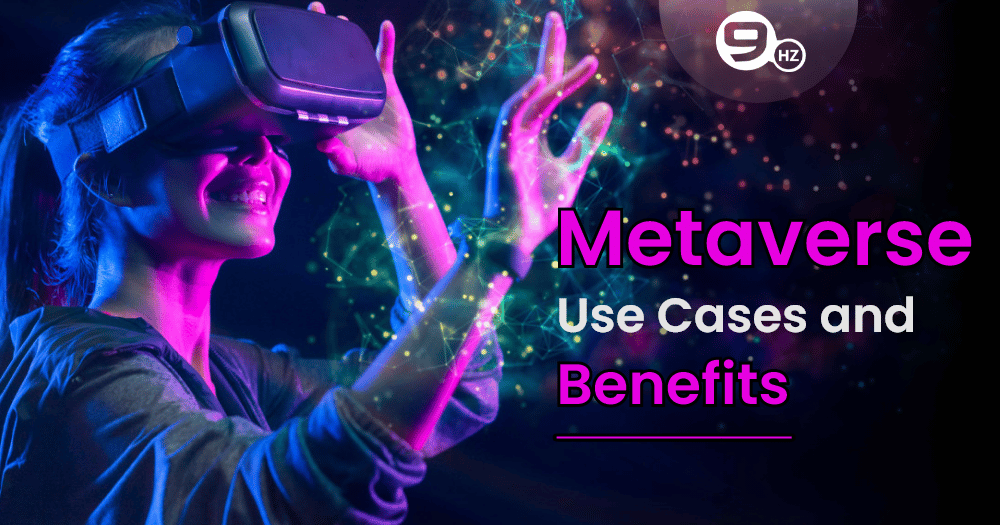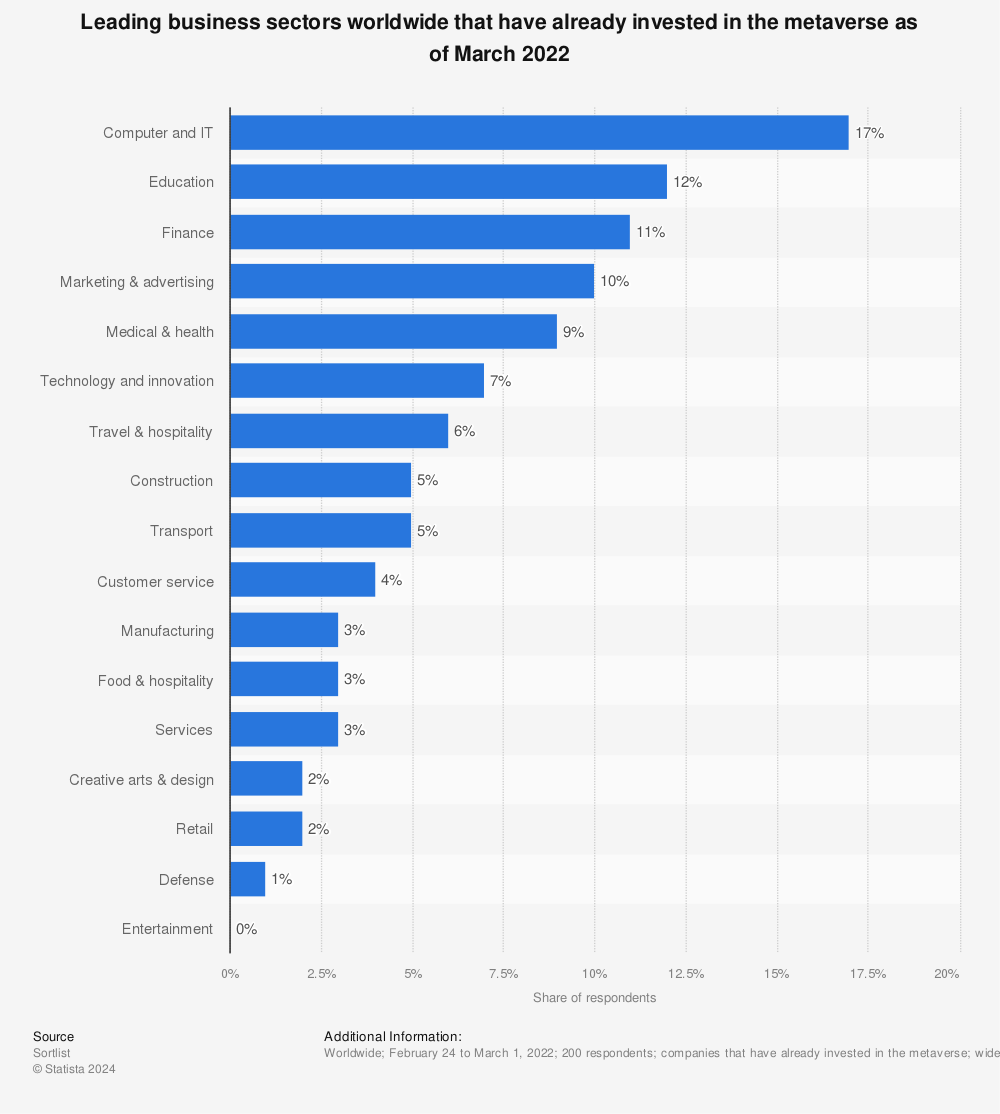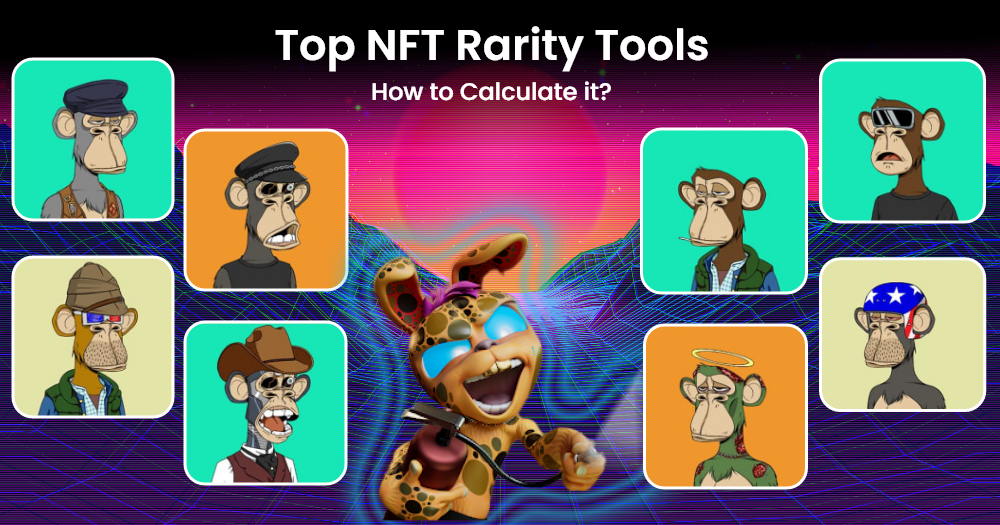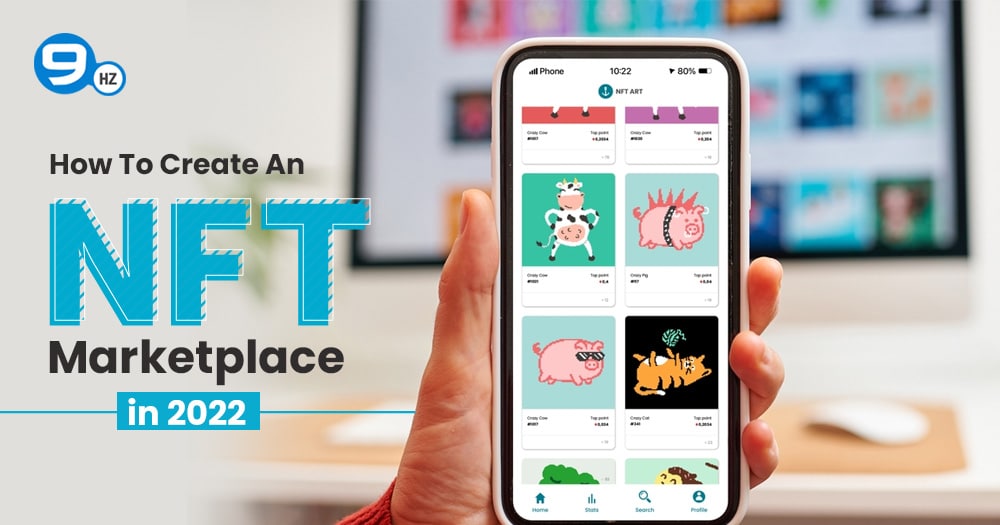The internet continues to transform with multiple iterations, bringing fantastic opportunities. The power of digital evolution is evident in everything we do, from using static websites to navigating web 2 experiences. This chain of advancement continues with the Metaverse.
Businesses in the computer and IT sectors are the most likely to have invested in the metaverse according to a March 2022 survey. A total of 17% of companies in this sector have already invested in the metaverse as a business opportunity, with 12% of responding businesses having already taken advantage of this opportunity. The Metaverse concept gained popularity during the recent pandemic when people avoided in-person communication, companies implemented remote working policies, and people communicated through digital means. In this blog we will walkthrough with metaverse use cases and benefits. Let’s take a quick glance at it.
What is Metaverse?
A metaverse is a place where hybrid and digital space coexist. As a 3D web-based space, Metaverse combines augmented reality and virtual reality technologies. In Metaverse, users can interact with each other in a digital universe and perform any activity they choose. There are digital items, decentralized metaverse NFTs, avatars, and a lot more in this virtual interconnected space. Metaverses are popular around the world, with multiple definitions representing different viewpoints. Defining Metaverse simply means a three-dimensional web powered by augmented and virtual reality. Its key characteristics are persistence, self-sustaining, infinity, interoperability, and real-time.
The concept of metaverse is broad. In every key area, such as education, gaming, tourism, and healthcare, metaverse applications can be used for better perspective. AR and VR trends are already based on Metaverse approaches in more than 40% of cases.
A new development in the metaverse claims that technology can bring the internet of things (IoT) and artificial intelligence (AI) to its arena, as well as holographic avatars and holograms. Businesses are already benefiting from these technologies, but what does Metaverse mean to the Real- world and businesses? Let’s take a look! You might be interested to know about top metaverse companies in the world.
What are the Implications of Metaverse for Businesses?
The Metaverse is capable of replicating the real world through the use of revolutionary technologies such as AR and VR. Metaverse offers various business opportunities to enterprises worldwide as the next generation of internet and social media.
In the future, for instance;
- With 3D technology, Metaverse brings unique storytelling experiences to advertising.
- Digital events can be conducted and entered via the interoperable concept in the Metaverse project.
- Metaverse allows brands to interact with global audiences in the ecommerce framework, despite geographical barriers.
- As a result of Metaverse’s support for digital wallets, enterprises will be able to manage seamless transactions across its ecosystem of virtualization.
Find more statistics at Statista
Businesses benefit from Metaverse in a variety of ways. Businesses will leverage Metaverse applications based on their business models and user requirements. Metaverse has been invested in by more than 17% of the global IT enterprises according to a recent survey conducted in March 2022. In addition, 9-12 percent of other industries are adopting Metaverse, including Education, Finance, Healthcare, and Marketing.
What are the Metaverse Use Cases and Applications?
| Metaverse Use Cases | Benefits of Metaverse Applications |
|---|---|
| e-Learning |
|
| Real Estate |
|
| Banking and Finance |
|
| Travel and Tourism |
|
| Gaming |
|
-
Use Cases of Metaverse-Based Blockchain for Advanced Technology
Use cases of metaverse blockchain decentralized and transparent solutions across major industries require blockchain or decentralized technology. Cryptocurrencies like Bitcoin, Ether, and Dogecoin are powered by blockchain technology, but this technology does far more than compliment and maintains cryptocurrencies. It can be used as a distributed ledger for recording peer-to-peer transactions and for creating non-fungible tokens (NFTs) and decentralized applications (dApps).
By transforming a single digital space into huge metaverse NFT marketplaces, companies can design more engaging and realistic marketplaces where users can interact with each other, look at desired NFTs, and make better purchasing decisions. In addition to offering a shared virtual space, Metaverse is promoting new NFT or metaverse blockchain games that allow players to acquire in-game collectables and trade them with others. Next-generation online games Are Developed Using The Metaverse By Blockchain-Based Developers.
-
Spaces for Virtual Work and Learning
As a result of the COVID-19 pandemic, businesses around the world have adopted vast virtual space for communication. Work-from-home arrangements and remote work have also become much more popular with video conferencing platforms. Real-time audio and video interactions prevent these platforms from providing a compelling, engaging experience.
Using Metaverse’s graphically immersive virtual spaces, 3D avatars, and immersive meetings, users can overcome the pandemics limitation with ultimate virtual reality experience.
-
A virtual Market and Business
In today’s virtual businesses environment, technology creates new virtual office space for businesses, helping them to promote their services and offerings more effectively. By adopting lifelike virtualized spaces for a profound experience, enterprises are emerging from the two-dimensional metaverse business surface of e-commerce.
During the trading process, e-commerce business owners can inspect products, negotiate deals, and finalize deals with merchants in a virtual environment. In addition, metaverse offers interactive and realistic marketing content with a better influence approach on customers than digital marketing.
-
The Expansion of Social Media Universe
In addition to connecting people through social media platforms and mixed reality platforms Mark Zuckerberg and the team behind Metaverse platforms understand that technology can do much more through metaverse social media platforms. They envision a three-dimensional space instead of just watching people on computers or mobile screens and listening to their voices by embracing the Metaverse.
By creating a sense of presence among social media users, a metaverse concept-based platform provides a more immersive experience in online entertainment. The combination of virtual reality and augmented reality allows for a more realistic digital experience than that offered by social media alone.
-
Gaming Industry
Metaverse games is said to be a core and primary investment for the online gaming industry. Using metaverse technology, players can interact within an interoperable environment with other participants.
Successful gaming and entertainment industries are using shared virtual space-based Metaverse online gaming. There are more than 350,000 active users on Axie Infinity on an average daily basis and over 3 million users on a monthly basis. In addition, top Metaverse games have specific features that make the experience unique for players.
-
Travel and Tourism
There are several forward-looking applications of Metaverse, among them is virtual tourism. For users who cannot travel long distances, this technology allows them to enjoy virtual reality holidays. In the travel industry, experts claim the metaverse presents as a breakthrough in immersive digital experiences via AR and VR.
It allows you to have virtual tours of the recorded location and also be present with realistic effects in the desired location with a 360° virtual tour.
-
Real Estate
A Metaverse real estate tour offers its clients an ultimate immersive digital environment, which is one of its core features. Metaverse is a great solution for a market niche such as real estate through its virtual lands.
Metaverse project for property tour options help both realtors and clients to buy land in metaverse, eliminating the need to travel to property sites. Along with this, it allows prospective buyers to explore all options in real-time.
-
Healthcare
The healthcare metaverse has opened new channels for delivering low-cost, high-quality healthcare. In virtual 3D clinics fueled by the Metaverse post pandemic, telemedicine and telehealth are concepts that allow patients and doctors to interact virtually.
Patients suffering from anxiety and panic can use Therapy to transport themselves to a relaxing virtual environment.
-
Banking and Finance
Launch Your Own Metaverse App
Want to Create Metaverse World?
The use of metaverse in banking is underrated but flourishing and taking new heights. Through the banking metaverse, you can view physical banks from anywhere in the world. Metaverse banking can be accessed from your laptop or mobile device even if you do not have a VR headset.
Real-World Examples of ‘Metaverse’
There has been a significant change in the world since the COVID-19 pandemic. The practice of social distancing has become common in shopping malls, for example. There have even been some temporary shutdowns.
Companies adopt remote working models, and people have become isolated from huge gatherings, meet-ups, and other events. However, people have missed meeting in person, working in a unique environment, and attending gatherings.
- Take a moment to think about a friend. Then, suddenly, you call that friend to arrange a meeting, and they arrive just a few minutes later. Is it possible to do this? With the Metaverse, it is.
- Virtual reality headsets are all you need to augment your surroundings virtually. The virtual world of Metaverse is not real, but it is very close to it. Using haptic gloves, users will soon be able to touch and feel virtual objects within the Metaverse as technology advances.
What are the Benefits of Metaverse?
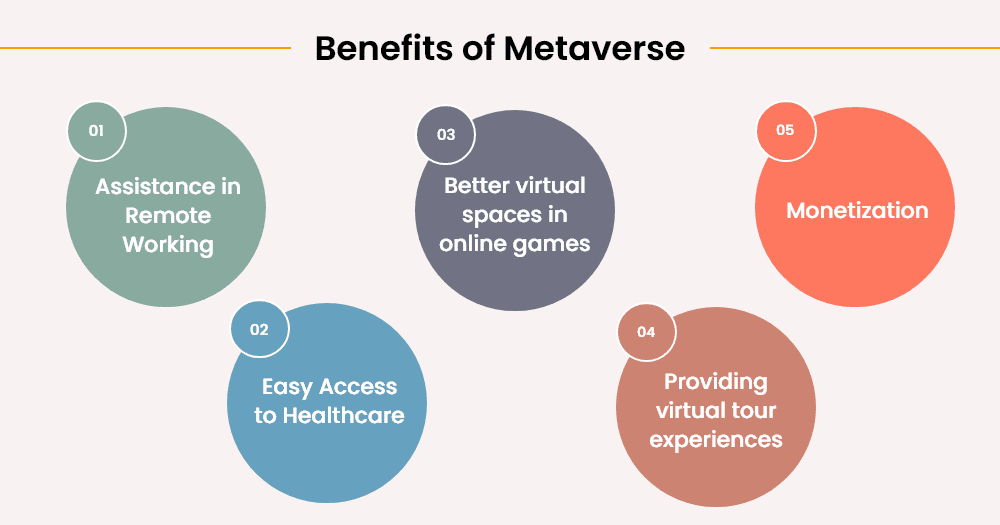
In the age of telecommuting, people are increasingly interacting and interacting online through virtual spaces, digital modes of communication and metaverse architecture.
In a 3-D immersive world, metaverse applications allow users to enhance their existing digital experience. Metaverse provides us with the following key benefits.
-
Assistance in Remote Working
There are numerous challenges associated with remote work that Metaverse can address. It offers managers the opportunity to communicate and interact with their employees in a virtual environment and retain in-person interactions. Additionally, keeping track of the team inside a virtual office can solve workplace problems like time theft and goldbrick.
-
Easy Access to Healthcare
The metaverse is a useful for healthcare professionals and medical staff who were unable to travel to patients because of geographical restrictions. By interacting with the patient in the Metaverse, they can gain a clearer understanding of their health condition.
-
Better Virtual Spaces in Online Games
Currently, most of the Metaverse games are decentralized and supported by a play-to-earn economic model. NFTs are used in such games to trade in-game assets. Furthermore, avatars exploring vast virtual spaces appeals to players.
-
Providing Virtual Tour Experiences
It is adventurous to travel, but not everyone is able to go to the places they choose. Metaverse allows people to virtually travel to places they can’t physically visit, and this is where it comes into play. A first-person experience is being created using the metaverse, augmented reality, and virtual reality.
-
Monetization
Metaverse integrated economic model is of interest to many people. Many users are looking for ways to generate income through the ecosystem, while some are development enthusiasts. In the Metaverse, both groups can meet their needs. The Metaverse ecosystem is open-source, allowing anyone to build a relevant project on top of it. Likewise, people can create and trade NFTs to earn money by joining the ecosystem as common users.
What are the Business Opportunities in Metaverse?
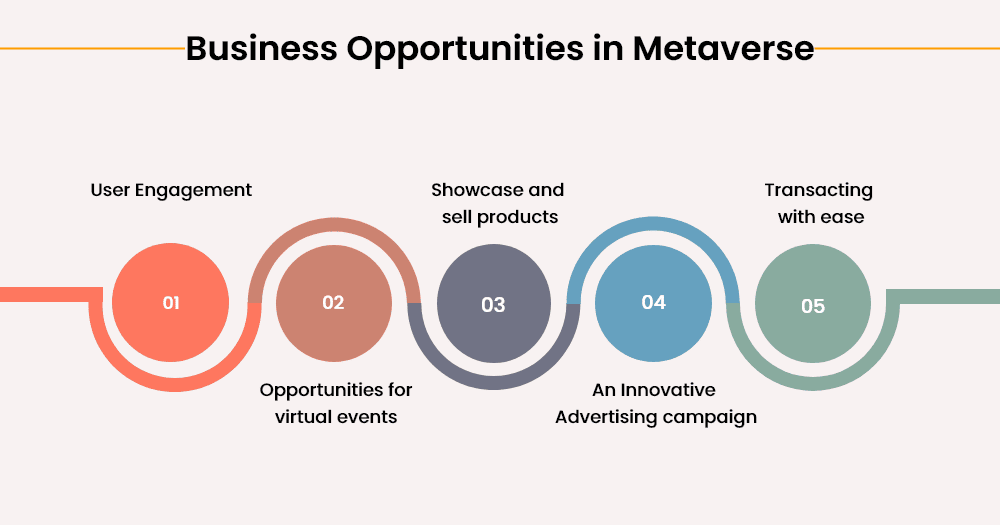
There are thousands of advantages to doing business in the Metaverse. There is now a parallel virtual world among real-world audiences, which a decade ago was an unimaginable dream. As a result, modern businesses need to evaluate potential Metaverse advantages and disadvantages to make informed decisions.
Here the benefits of the Metaverse in Businesses:
-
User Engagement
Online users have access to a whole new level of entertainment thanks to the Metaverse. You may gain a more engaged and interactive audience for your brand if you introduce a Metaverse experience to your customers. Virtual goods, gaming adventures, and AR/VR showrooms are just some of the options you can offer to your customers.
-
Opportunities for Virtual Events
On screen, your favourite artist’s live performance may not be as impressive as in the Metaverse. If you want to give your customers a sense of presence in their desired destination, you can even organise a virtual event for them.
Metaverse radar can also help museums and galleries get the attention they deserve. The NFT avatar exhibition held very recently sold 300 unique avatars within a day.
-
Showcase and Sell Products
The Metaverse allows eCommerce brands and businesses to offer customers a better experience when it comes to trying clothes, glasses, home furnishings, and everything else. Additionally, companies can set up virtual stores and showcase their products and services, gaining access to a large number of new customers.
-
An Innovative Advertising Campaign
With Metaverse, innovative brand storytelling is introduced to build brand awareness and business identity. Through Metaverse, storytelling will be transformed into a participatory experience where the audience is more than just a passive listener.
-
Transacting with Ease
Cryptocurrency and Metaverse benefits walk hand in hand. Wallets and cryptocurrencies have made it even easier to store digital money in today’s digital world. Payments in the Metaverse world are just a few taps away, so users don’t need to link bank accounts.
Which Technologies Power the Metaverse Applications?
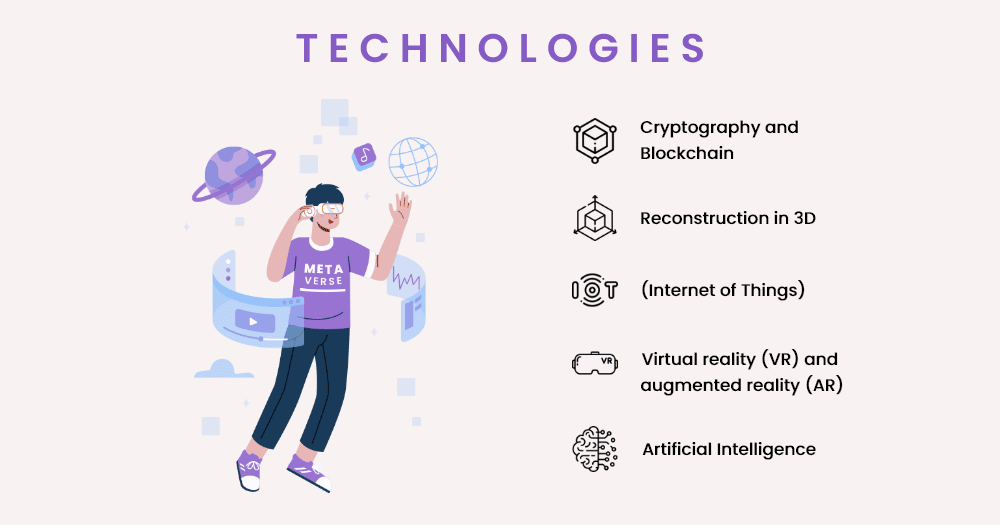
The Metaverse benefits are being made more immersive by companies. Blockchains, augmented reality, artificial intelligence, IoT, and 3D reconstruction enable them to create this virtual world. Let’s see how these technologies enhance the Metaverse in this context.
-
Cryptography and Blockchain
It is crucial for the continued development and evolution of the Metaverse to utilise blockchain technology. decentralized and transparent blockchain solutions can be built by enterprises to provide digital proof of ownership, digital collectability, value transfer, and interoperability.
A cryptocurrency also acts as a medium of exchange for transferring value between users as they explore and socialise in a virtual 3-D space. For instance, gamers on popular games like Decentraland must purchase virtual land and other accessories with native digital currency MANA.
-
Reconstruction in 3D
The technology of 3-D isn’t new, but it has become more powerful with multiple iterations. Real-estate businesses are among the industries that have benefited from 3-D reconstruction.
People missed in-person visits to properties they wanted to buy due to long shutdowns and social distancing practices. With the help of 3-D reconstruction technology, real-estate agencies can now take potential buyers on property tours without having to physically meet them.
-
The Artificial Intelligence
Our everyday lives are replete with applications of artificial intelligence (AI): business automation, strategies and planning, facial recognition, faster computing, etc. AI has also enabled immersive virtual environments to be created.
The Metaverse benefits from AI in many ways, regardless of the project (gaming, commercial, or general niche):
- The use of artificial intelligence has made it easier and faster to process and manage data.
- AI enhances the interactions and actions of nonplayer characters in the Metaverse.
-
Virtual Reality (VR) and Augmented Reality (AR)
As a result of their immersive 3-D experience, AR and VR are crucial components of Metaverse. Virtual worlds, Metaverses, or similar digital space can be accessed through adopting vr solutions technologies. How do augmented reality and virtual reality differ? Here are some definitions.
The real world is morphed through the use of visual elements and graphical characters. Any digital device with a smart camera can access AR applications, which allow users to view their surroundings through attractive digital visuals.
There are many differences between AR and Metaverse virtual clones, and the concepts are similar. Through VR headsets, gloves, and digital sensors, users can explore a complete computer-generated digital world.
-
IoT (Internet of Things)
With IoT, we are able to send and receive data through sensors between our physical world and the internet.
Using the IoT use cases and benefits in the Metaverse, items can be collected from the physical world and rendered into virtual space, increasing the accuracy of digital representations. Based on the changing environment and other instances within the Metaverse, IoT data feeds can determine the functioning of objects.
Digitally interoperable infrastructure enables the recreation of real-world processes in a 3-D virtual world using IoT technology. By utilizing AI and machine learning, IoT can further upgrade the Metaverse ecosystem
What are the Existing Top Metaverse Projects?
Metaverse technology projects are multiplying exponentially since it is the hottest tech topic today, resulting in all industries jumping into its horizon. Here are some of the top Metaverse projects currently in development.
-
Metaverse of Gaming – Decentraland
Global users can create digital avatars, explore, and trade NFTs in a realistic and immersive virtual world created by Decentraland , a gaming-based decentralized metaverse technology. Besides purchasing land, hosting live events, playing games, and doing exciting activities, users can also buy property within the world.
Platform users own and regulate the platform through a decentralized autonomous organisation (DAO). Voting on feature upgrades and optimizations, proposing significant changes, and participating in governance is possible for users. Interoperability with multiple Metaverse projects will be Decentraland’s next major feature.
-
The Metaverse of Real Estate – Upland
With Upland metaverse technology, gamers can buy, sell, and trade properties mapped to real-world addresses using blockchain technology. A user can become a “digital landowner” on this platform by owning and trading NFTs that represent properties, earning UPX coins in return.
Rather than building a digital economy that blurs the divide between the real world and the digital world, Upland aims to build a digital economy that serves both the real and digital worlds.
-
Metaverse with Multiple Purposes – Enjin
In Enjin, virtual space can be created on its horizon, and it is based on the Ethereum blockchain. Businesses can create decentralized NFT marketplaces, create NFTs, integrate them, and trade them to earn money with real value, depending on their industry niche. Developers were free to create an e-commerce, gaming, real estate, or branding marketplace on the platform without any limitations.
Enjin’s platform allows users to easily manage and store their NFTs by leveraging its security features. The process of acquiring, minting, gaming, trading, and melting Enjin can be explained in a few simple steps.
What Challenges are Likely to Arise in the Metaverse?
We will see a shift in our perception of the internet and social media interaction with Metaverse, undoubtedly the greatest innovation in the virtual reality world. Use cases of Metaverse are still in their infancy. Let’s look at some of the limitations of the Metaverse since it is a new technology that presents some potential challenges.
- It’s difficult to identify people in the Metaverse, unlike in the real world. An avatar’s voice, facial expressions, and features must be verified to verify its owner.
- Scammers or bots can use an avatar to damage the reputation of someone.
- Privacy concerns are another important challenge. As VR and AR devices are equipped with cameras and unique identifiers, they can leak personal data from the Metaverse.
It is important to note that not all Metaverse projects are linked to these challenges. One can easily create and launch a customized virtual world with complete knowledge about Metaverse development and a professional team.
Why Choose The NineHertz for Metaverse Application Development?
The NineHertz is the leading Metaverse development comapany. The NineHertz’s services cover a diverse range of industry niches. Developing futuristic projects requires developers who are familiar with technologies such as blockchain, NFTs, crypto, VR, AR, and more.
We Support the development of gaming, NFT marketplace, AR, VR, eCommerce, real estate and many more. Additionally, our team tailors the project to meet your specific requirements. Here are some of the services we offer in the Metaverse.
- Metaverse Avatar Development
- Metaverse NFT Marketplace Development
- Metaverse Integration Services
- Metaverse Gaming Development
- 3-D Space Development
- Metaverse App Development
Contact us if you are interested in hiring Metaverse development services or optimizing your existing Metaverse blockchain project. Describe your metaverse use cases to us, and we’ll be happy to assist.
FAQs on Metaverse Use Cases and Benefits
1. Is Metaverse Real?
The metaverse is a real concept, but it sounds like something from a science fiction book, and that’s because it is. As described in the novel, the metaverse that dominates the media today is not the same as what is portrayed in the media today. Your online experiences will be more immersive and social with the metaverse in development. There are no tangible elements in that universe, however. It’s more of an augmented or virtual metaverse.
2. Which Industries Can Use Metaverse?
Many sectors, including education, gaming, tourism, and healthcare, utilize metaverse applications. Here are some examples of the Metaverse that apply to a variety of industries:
- The gaming industry
- The travel and tourism industry
- Educating and learning
- The concept of remote working
- The real estate market
- The healthcare industry
- Finance and banking, etc.
3. What will be the Benefits of Metaverse?
Metaverse is now on buzz these days and so as offer several benefits, let’s take a look:
- The ability to connect the world and negate physical distances.
- An immersive experience.
- Improved social interactions online.
- Social media upgrades.
- Opportunities for new businesses.
- Educational and learning improvements in the virtual world.
4. How will Metaverse Change the World?
There will be a significant change in how we interact with the world due to the metaverse. We also saw a significant impact on life as we knew it after the global pandemic and lockdowns. Furthermore, it paved the way for people to live indoors and connect exclusively via virtual reality, which greatly boosts the metaverse.
Conclusion
A significant number of businesses are eagerly anticipating the implementation of digital avatars and enjoying their benefits. We are still in the development phase of Metaverse, and it is constantly evolving. Furthermore, the technology hasn’t fully realized its full potential. Despite this, metaverse use cases appear to be on the verge of becoming mainstream due to their rapid adoption in different industries.
Great Together!
